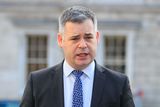Older than the State: the influential TK Whitaker is 100
The man who devised the blueprint for Ireland's modernisation becomes a centenarian this Thursday, writes Anne Chambers
He has done the state some service: TK Whitaker with Taoiseach Enda Kenny in 2014 Picture: Mark Condren
TK Whitaker's long life of public service parallels the history of the modern Irish state in whose economic, financial, social, educational, political and cultural evolution he played a pivotal role.
In 1956, aged 39, he became secretary of the Department of Finance. Against a background of economic stagnation, rampant emigration and an atmosphere of national despondency, in 1958 he devised Economic Development, a blueprint for the economic regeneration of the country.
Detailed, meticulous and practical, written in a style and language aimed at the ordinary citizen as much as at politicians, he offered a radical remedy: the replacement of non-productive by productive capital expenditure, the introduction of free trade and an end to the isolation and protectionism of the previous era. Above all, Economic Development offered hope and a way out of the economic quagmire in which Ireland and its people were bound and led to a period of growth, optimism and equilibrium in State finances.
Whitaker's role as Governor of the Central Bank, during a period of economic instability in the 1970s, has a relevance today in light of the recent banking collapse.
Maintaining the autonomy of the Central Bank vis-a-vis both the Government and the Commercial Banking system, in 1970 he successfully resisted Government attempts to obtain statutory control over the implementation of credit policy - a move, as he told the Minister for Finance, he "did not consider to be in the national interest".
He ensured that the Bank fulfilled its statutory obligation in relation to credit control (especially to the over-heating building industry) stemmed the inflow of foreign capital and resisted numerous government attempts to fund non-productive expenditure out of Central Bank coffers.
In the area of regulation and supervision, under his governorship, the Central Bank's control over the Irish banking system evolved and strengthened.
During the 1960s, Whitaker spear-headed Ireland's convoluted path towards the European Economic Community, leading many delegations to European capitals.
His later unease that the idealism, the community ethos - the 'elan vital' as he refers to it - that motivated the EEC's founding fathers, were being sidelined has an echo today in view of the sense of disconnect and disillusionment apparent within the EU.
It is also interesting to note his less-than-enthusiastic reaction to Ireland's abandonment of sterling in 1979, a move he then, perhaps prophetically, described as being "a quixotic gesture".
Between 1967 and 1997, he played a behind-the-scenes role in the search for peace in Northern Ireland.
As far back as the 1950s, he initiated cross-border relationships with his opposite numbers in the Northern Ireland administration and in 1965 arranged the historic meeting between Sean Lemass and Captain Terence O'Neill.
In 1969 he wrote Jack Lynch's famous Tralee Speech which, for the first time, committed the Irish Government to a policy of reunification by the principle of consent. In the 1970s he embarked on a series of meetings with contacts in the public service and banking sectors in Northern Ireland and in the UK from which many policy documents emanated which, in turn, informed government policy both in the Republic and in the UK.
One of his own policy documents, Northern Ireland - A Possible Solution, which he wrote in 1971 is, in reality, the basis of the Good Friday Agreement almost 30 years later.
His approach to the Irish language, both in his personal and public life, and as first chairman of Bord na Gaeilge, was one of practical application, from his promotion of bilingualism as a national policy, to the preservation of the remaining Gaeltachts.
In a world exposed to ever-changing technological advances and to the standardisation and globalisation of every aspect of life, including culture and language, as he now notes, government policy is no longer enough to ensure the survival of the Irish language.
It requires an acknowledgement by all of us that the language is worth saving and that we have the will as a society to ensure that it does.
During his lifetime, Whitaker has received numerous national and international honours.
It is to the credit of the ordinary Irish public, however, who saw through the subjectivity of historical and political iconology and the tinsel of celebrity, to confer the accolade 'Irishman of the 20th Century' on a former public servant, someone whose work over many decades transformed and improved the lives of generations, who spoke his mind with integrity and honesty on matters of public concern and who neither sought nor acquired personal gain in the process.
Whitaker's own words best sum up the essence which motivated and guided his many undertakings throughout his long life of public service: "Let us remember that we are not seeking economic progress for purely materialistic reasons - but because it makes possible relief of hardship and want, the establishment of a better social order, the raising of human dignity, and, eventually, the participation of all in the benefits, moral and cultural, as well as material, of spending their lives and bringing up their families in Ireland."
Anne Chambers is the author of 'TK Whitaker: Portrait of a Patriot'
Join the Irish Independent WhatsApp channel
Stay up to date with all the latest news














